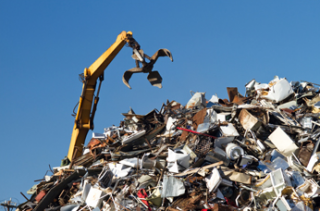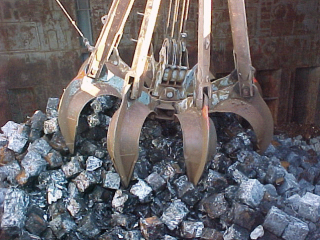Radioactive Material in Scrap Metal
- If radioactive material is improperly disposed, it can contaminate and shut down an entire facility. The cost of cleaning up can easily exceed a million dollars.
- You will probably never come into contact with contaminated scrap metal. However, if you think you have found contaminated scrap metal, do not touch it. Immediately contact the manager of the scrap yard and your state radiation office.
Sometimes radioactive materials are disposed of improperly and end up in scrap metal yards or landfills. Melting radioactive sources with non-radioactive materials scrap metal can create recycled metal that is now radioactive.
About Radioactive Material in Scrap Metal
Radioactive materials should not be disposed of in the same manner as regular trash or recycling. There are special handling and disposal requirements for radioactive materials to keep radioactive materials out of regular junk yards and scrap metal yards.
Sometimes items containing radioactive sources are disposed of improperly. Although they are usually small, different types of radioactive material have different amounts of radioactivity that they emit. This can also include metals such as piping from facilities that process oil and gas, from water treatment facilities, and from mining operations, may be contaminated with Technically Enhanced Naturally Occurring Radioactive Material (TENORM). This may be because the radioactive material is not marked properly, or the owner of the material does not follow proper disposal guidelines. These are often referred to as abandoned or orphaned sources.

Source: Occupational Safety and Health Administration (OSHA)
If radioactive materials are disposed of improperly or sent for recycling as scrap metal, they can end up at a facility that is not licensed to handle them. If a scrap metal yard or recycling facility unknowingly melts an item that contains radioactive material, the radioactive materials contaminate the metal, the processing equipment and the facility. Recycling radioactive materials at unlicensed facilities also exposes the workers to radiation.
To help detect incoming materials that should not be processed, recycling facilities have devices called portal monitors. These devices detect radiation when scanning batches of scrap metal. It is important to detect incoming radioactive materials before they are processed at a scrap metal yard because radioactively contaminated sites pose a health risk to workers and cleaning up processing equipment and processing sites can cost millions of dollars.
What You Can Do

- Be aware. It is highly unlikely that you would come into contact with radioactively contaminated scrap metal. However, if you think you have found contaminated scrap metal, do not touch it. Immediately contact the manager of the scrap yard and your state radiation control office. The CRCPD maintains a special permit from the DOT to allow the return of the shipment to its origin without additional paperwork.
- Limit your exposure. Until you know differently, treat the suspected radioactive material as though it were a radioactive source and limit your exposure. Three basic ways to limit possible exposure include:
- Time: Limit the time spent near the radiation source.
- Distance: Increase the distance between you and the radiation source.
- Shielding: Put something (the heavier and thicker, the better) between you and the radiation source.
